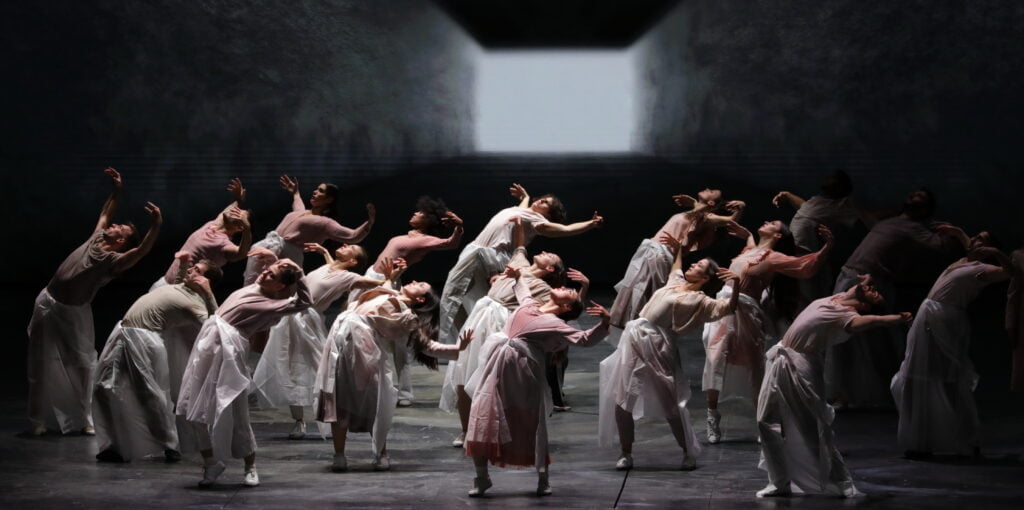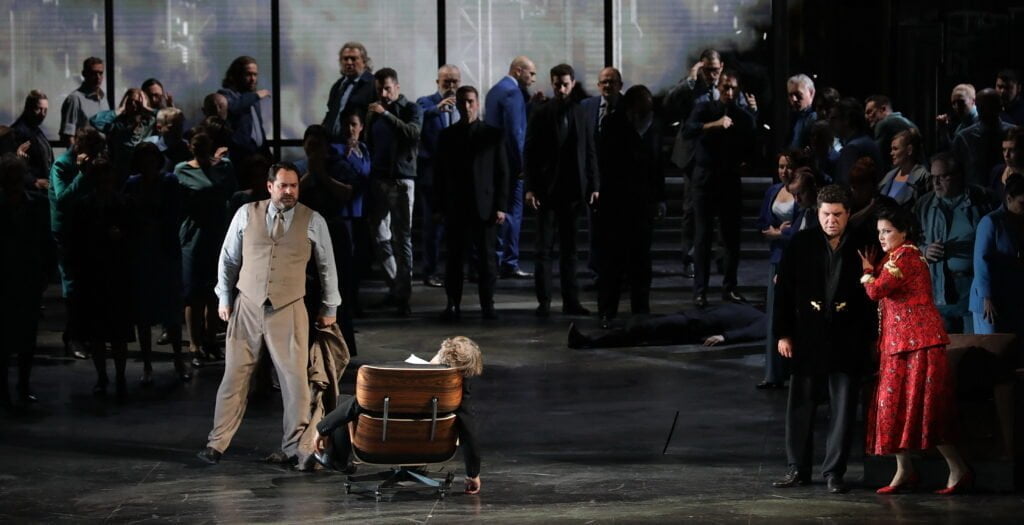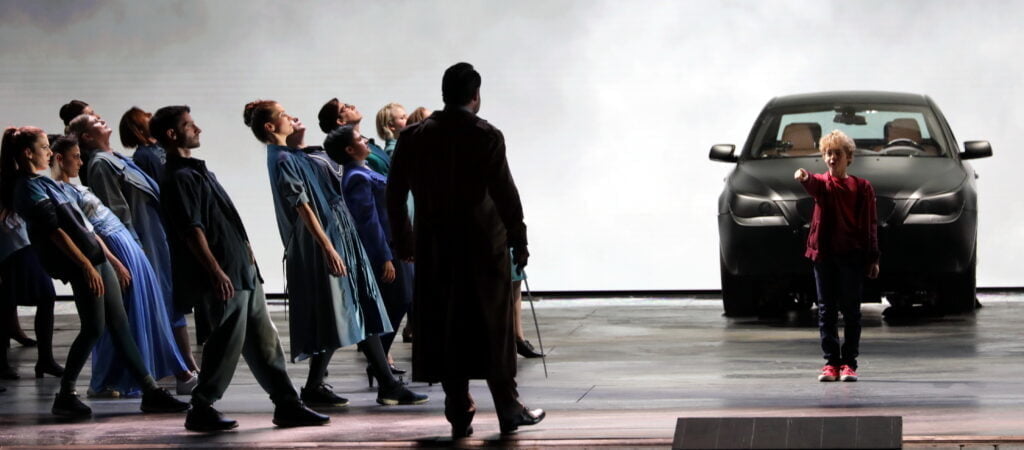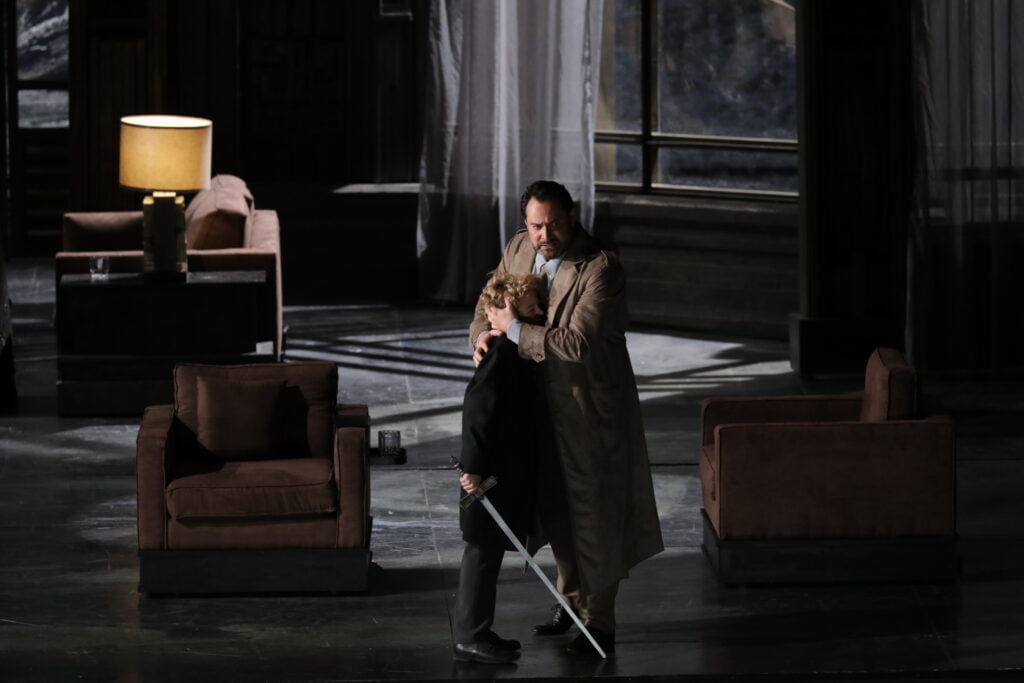Macbeth by Giuseppe Verdi. Opera in four acts. 1847. Libretto by Francesco Maria Piave, after the play by Shakespeare. First performance at the Teatro della Pergola, Florence, on 14th March 1847.
TEATRO ALLA SCALA
Attended performance: premiere, December 10, 2021
Macbeth: Luca Salsi; Banco: Ildar Abdrazakov; Lady Macbeth: Anna Netrebko; Lady Macbeth’s Dame: Chiara Isotton; Macduff: Francesco Meli; Malcolm: Iván Ayón Rivas; Doctor: Andrea Pellegrini; Servant: Leonardo Galeazzi; Hitman: Alberto Rota; Teatro alla Scala Orchestra and Chorus; Conductor: Riccardo Chailly; Staging: Davide Livermore
Music: 3**
Direction: 1*
There are several ways to write a review. Normally, the reviewer attends a show and then tries to inform readers about what he/she has seen and heard, the staging, the singers, and the musical performance. But the Macbeth by Verdi that we attended at the Teatro alla Scala was out of the ordinary, and although a simple review as the one described above is feasible, it would never give an exact idea of the impression reported by yours truly while attending the show.
We suppose the point is that like most of Italian opera fans, we attended the RAI broadcast on December 7, and this was perhaps a mistake, as the two shows (television and in-house live) are like night and day.
Story invented by the director
At La Scala we essentially witnessed yet another case of “Regietheater,” i.e., in practice, the usual transposition of a well-known and loved opera into a different story, taking place in present times, with characters, scenes, and situations that have nothing in common with those conceived by the authors, and therefore – for those who know the opera – very difficult to follow. Many long-time operagoers like ourselves simply told us they didn’t understand a thing. And honestly, that’s the way it was for us too. We admit that we are unable to tell you the story as the director invented it. We do not know who Macbeth (a mafia boss? A Trump-like tycoon?) Banco, or Macduff (his collaborators? His accomplices? His subordinates?) are, or what they do – according to Davide Livermore. Nor do we understand why the witches are dressed and acting (apparently) as secretaries. We only know that the Lady (who, like all the other characters, smokes and drinks all the time and is dressed like a circus tamer) is probably his wife.

We do not know why, during the prelude to the opera, Macbeth and Banco are surrounded by corpses. They cannot be back from a battle, since both are in civilian modern clothes, jacket, tie, waistcoat, overcoat, but they are armed with swords… just like the protagonist of the Highlander TV series, who wanders everywhere with a broadsword under his coat.
A car, always a car
Once the massacre is completed, they get into a car and in the background a film of a road in the woods starts, which quite effectively gives the impression of the car in motion. Thus they arrive in a city, clearly inspired by a number of films about some future “dystopian” society, and, after having suffered the assault of a gang of thugs, subsequently dispersed at the sight of the witches (or rather, knowing the original the story one thinks they are the witches, but they actually are men and women in street clothes), they go up on an elevator. For the entire duration of the opera, this elevator is the dominant element of the scene, and Banco and his son even emerge from it when they are in the woods (!). (Please note that soon after, Banco dies on a sofa – surrounded by trees, killed by the thrust of an assassin’s knife, and his son seeks safety by running three times across the stage, but without anyone chasing him.)

Anyway, after the car journey, the filmed scenes – a “future” city, sometimes tilted, other times upside down, reminiscent of famous films, from Metropolis to Blade Runner and beyond – keep changing and moving, but mostly remain in the background, and almost everything takes place in a fixed scenography, on two floors that alternate up and down. And this is the main difference between the live show and the televised one, in which, instead, the filmed scenes are omnipresent, fill the screen and distract enormously from listening to the music (not to mention the appalling shots from above that are totally incompatible with any theatrical performance).
It would be impossible, and probably even useless, to report all the innumerable inconsistencies between Verdi’s (or Shakespeare’s) Macbeth and this show full of meaningless, often involuntarily comic “gimmicks” (for example, the three-legged table that swings while the witches contact the spirits. Or Macduff and Macbeth, in the final duel, momentarily losing their swords and fighting by fists, like in an old western movie saloon). Suffice it to say that everything that happens has absolutely nothing in common with Verdi’s opera, that what we see is “quite another thing”, and that, as always, music is just a soundtrack, difficult to follow carefully due to the overload of images that inundate us, especially in the televised version.
Television show
We therefore agree with the comment made, during the live TV broadcast, by Alberto Mattioli, one of the best-known and most followed Italian critics. Though we are perpetually in conflict with him, as he is one of the most ardent supporters of “new at any cost,” on this occasion, we believe that he made a very correct observation: “It is a show conceived for television.”
And this is really the point that marks the difference from anything else we have seen before. It threatens to truly be the show of the future, the first example of what might sound the death knell for the live theater experience, replaced by an “at-home” picture show, so to speak. Like today’s younger audience, for whom “video clips” (the short films that superimpose images, often disconnected from the text, to the music of the songs) have almost become an irreplaceable “must”, many opera fans saw this Macbeth as a gigantic “video clip,” which favors moving images over the musical performance, which has been mercilessly pushed into the background.
In all this, the singers are, as often happens in Regietheater, severely penalized. Both protagonists have been accused of “vulgarity”, but how is it possible to blame them for a directorial interpretation that takes them light years away from the bloodthirsty, but royal characters of the original story?

As for their performance, Anna Netrebko does not have the voice for the role of the Lady, like other “heavy” roles that she has included in her repertoire, seriously threatening to ruin the beautiful “lirico” voice of her early years of career. However, having overcome the initial difficulties, she manages to give us, above all, an extremely effective interpretation of the sleepwalking scene. Luca Salsi is probably more at ease in this Macbeth so devoid of royalty. In fact, as a singer he is the exact opposite of the Verdi baritone; he completely lacks the nobility of accent, the elegance of the “linea di canto” (singing line) that the role requires, and which instead is the distinctive trait of Ildar Abdrazakov, much appreciated even in the short role of Banco (but with the prospect of the inauguration of 2022 with Boris). Probably – and unfortunately – today the role of Macbeth is better sung like this, as if he were Alfio, since the nobility of the character seems to elude “modern” producers.

Anonymous, however correct, is Francesco Meli‘s Macduff, and we would like to point out two interesting voices in the minor roles: the young tenor Ivan Ayon Rivas (Malcom) and especially the queen’s lady, Chiara Isotton. We await both in more demanding tests.
As for the musical point of view, we don’t feel like judging Riccardo Chailly’s conduction, overwhelmed as it is by the visual bombardment of images. We can only say that it seemed correct to us, even without especially great moments. And at times, in-house, too loud.
Completely upsetting the original story
Finally, we would like to add a more general consideration. In our opinion, as we already wrote, this production might be a turning point – a shocking one – in the history of opera. Not just a staging completely upsetting the original story (that would be sadly normal, nowadays) but a staging thought and created for a different media, for a different use, for a different audience.
There is no longer a question of being “traditional” or “modern”. That is not the problem. This TV Macbeth is another kind of show altogether.
Is this the future of opera, when the generation who knew it as it was originally conceived disappears, when night conquers day?
We are afraid we will soon know the answer.

A perfect review (as always). I saw it on TV; as a Tv clip well made indeed. The score was by Verdi, but it was not his opera. Is this the future of opera? According to Netrebko and Salsi it is. Fortunately, the future is not ours to see. Que sera, sera.
A really perfect review, I watched on TV and got many comments from friends on audience at Scala.